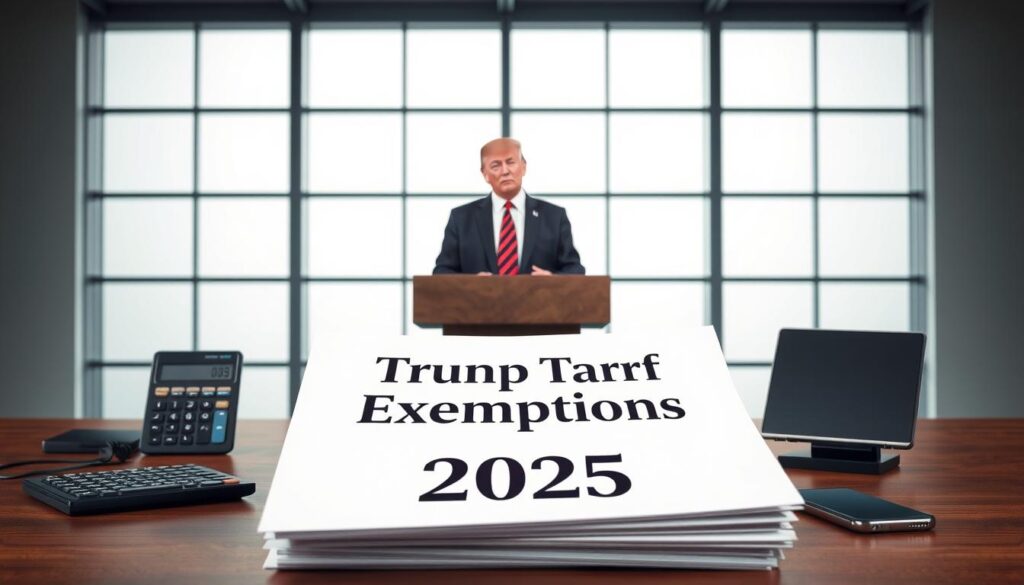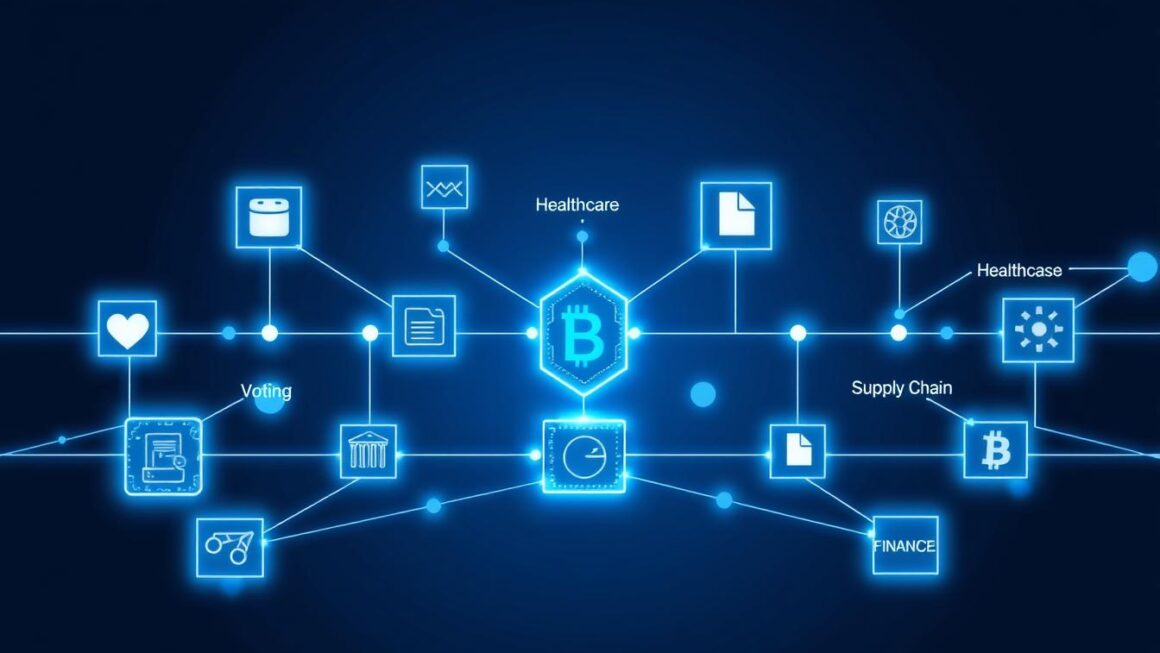The US administration’s recent decision to exempt certain electronic devices from tariffs has sent ripples through the tech industry. This move marks a significant shift in trade policy, particularly towards China.
The exemption of key technology products such as smartphones and laptops from the 125% tariffs on Chinese imports and the 10% global tariff is seen as a crucial development. It reflects a nuanced approach to trade, balancing protectionism with the need to keep critical tech components affordable.
This decision is expected to have far-reaching implications for the tech industry and consumers alike. As we delve into the details, it becomes clear that this move is more than just a policy tweak; it’s a strategic recalibration of trade priorities.
Key Takeaways
- The US administration has exempted smartphones, laptops, and certain electronic devices from tariffs.
- This move signifies a shift in the administration’s trade policy towards China.
- The exemptions apply to both Chinese imports and the global tariff.
- The decision is expected to impact the tech industry and consumers significantly.
- The move reflects a balanced approach to trade policy.
Trump Administration Announces Major Tech Tariff Exemptions

The Trump administration has taken a significant step by announcing major exemptions from tech tariffs. This move is the first significant softening in Trump’s conflict with China, indicating a potential shift in trade policies.
The exemptions apply to various tech products, providing relief to affected industries. We will examine the key products excluded from reciprocal tariffs and the implications of this decision.
Key Products Excluded from Reciprocal Tariffs
The new guidelines exclude certain tech products from Trump’s reciprocal tariffs. These exclusions are crucial for tech companies that rely heavily on imports from China.
- Smartphones and laptop components
- Semiconductor manufacturing equipment
- Other critical tech components
By exempting these products, the administration aims to support U.S. tech companies and promote domestic manufacturing.
Backdating to April 5, 2025
The tariff exemptions have been backdated to April 5, 2025, applying to products that had left warehouses by that date. This retroactive application provides clarity and financial planning advantages for U.S. shippers.
The backdating helps ease the transition for tech companies and supply chain operators, representing a practical consideration in implementing this significant trade policy shift.
Understanding Trump Tariff Exemptions 2025: Smartphone Laptop Tariffs, Semiconductor Trade
![]()
The 2025 tariff exemptions announced by the Trump administration mark a crucial development in the United States’ trade policy, especially concerning tariffs on smartphones, laptops, and semiconductors. This move is expected to have a significant impact on the tech industry, both domestically and internationally.
Scope of the 125% China Tariff Exemptions
The exemptions include machines used to make semiconductors, which is crucial for companies like Taiwan Semiconductor Manufacturing Co. that have announced major investments in the US. Additionally, semiconductor manufacturing equipment made by companies such as ASML Holding NV and Tokyo Electron Ltd. will be exempt, supporting the industry’s supply chain.
The 10% Global Baseline Tariff Exclusions
The tariff exclusions extend beyond China, affecting the 10% global baseline tariff applied to other countries, including South Korea, home to Samsung Electronics. This move supports tech companies and the broader semiconductor industry by reducing the cost of essential goods and equipment.
By exempting key equipment and components from Trump tariffs, the administration aims to bolster semiconductor manufacturing in the United States while acknowledging the global nature of the industry’s supply chain.
White House Rationale for Tech Exemptions
The recent announcement by the White House regarding tech tariff exemptions marks a critical juncture in US trade policy. This move is seen as a response to the significant market disruption caused by the initial tariff announcements, which triggered a selloff in stocks and ignited a rapidly escalating trade war with China.
The exemptions are expected to have a positive impact on consumers who had rushed to purchase smartphones and other devices amid fears that the tariffs would send prices soaring.
Push for Domestic Manufacturing
One key rationale behind these exemptions is to encourage domestic manufacturing. By reducing the tariffs on certain tech products, the White House aims to incentivize US companies to invest in domestic production, thereby boosting the local economy.
Balancing Economic Interests
The White House is also attempting to balance multiple economic interests through these tariffs exemptions. This includes ensuring consumer affordability, encouraging corporate investment, and maintaining market stability. The exemptions represent a win for major tech companies that have recently made substantial US investment pledges.
Impact on Tech Giants and Market Response
The announcement of Trump tariff exemptions in 2025 sent ripples through the tech industry, affecting major players and market dynamics. The exemptions were a significant move by the White House to alleviate some of the pressure on tech companies that had been vocal about the adverse effects of tariffs on their businesses.
Relief for Apple and Other Smartphone Manufacturers
Apple and other smartphone manufacturers received a boost as the tariffs on certain tech products were exempted. This exemption is expected to reduce costs for these companies, potentially stabilizing prices for consumers. The relief is particularly significant for companies heavily reliant on imports from countries affected by the tariffs.
Semiconductor Industry Implications
The semiconductor industry also saw implications from the tariff exemptions. With some semiconductor products excluded from the tariffs, manufacturers may benefit from reduced costs and increased competitiveness in the global market. However, the overall impact depends on the specific products exempted and the extent to which they align with the industry’s needs.
Market Reactions to the Announcement
The market reacted positively to the news of tariff exemptions, with stocks recovering some of the losses incurred after Trump’s initial tariff announcements. The S&P 500 had plunged more than 5% until the exemptions were announced, indicating a significant shift in investor sentiment. The benchmark 10-year Treasury yield, which had soared more than 50 basis points, also reflected the move in the bond market. The White House’s decision to implement these exemptions may have been influenced by the severe market reactions and the need to stabilize investor confidence.
Consumer Implications of the Tariff Exemptions
As the White House announces major tech tariff exemptions, consumers are left wondering about the potential impact on their wallets. The exemptions, while significant for tech giants and manufacturers, have varying implications for the end consumer.
The potential price impact on electronics is a crucial consideration. With certain tariffs exempted, manufacturers may pass the savings on to consumers, potentially lowering the prices of smartphones, laptops, and other electronic devices. Key factors influencing this include:
- Reduced production costs due to tariff exemptions
- Market competition driving price adjustments
- Manufacturers’ pricing strategies
Potential Price Impact on Electronics
The exemption of tariffs on certain electronic goods could lead to a decrease in prices for consumers. This is because manufacturers will have lower production costs, which could be passed on to consumers. Lower prices could boost demand for electronics, benefiting the tech industry as a whole.
Remaining 20% Fentanyl-Related Tariff Effects
However, not all tariffs have been exempted. A 20% duty on Chinese imports related to fentanyl remains in place, as confirmed by White House Deputy Chief of Staff on Policy Stephen Miller’s statement on X. This continued tariff will still affect the pricing of certain electronic goods, particularly those imported from China.
The ongoing 20% tariff is part of the administration’s strategy to pressure Beijing to crack down on fentanyl production and shipment of precursor materials. Companies will need to factor this tariff into their pricing strategies and manufacturing decisions.
Future of US-China Trade Relations
As we examine the Trump administration’s latest tariff exemptions, we must consider their implications for future US-China trade relations. The recent developments have sparked a mix of reactions from various stakeholders, including tech giants and industry experts.
The ongoing negotiations between the US and China are crucial in determining the future trajectory of trade relations. We can expect several key outcomes from these negotiations, including potential further exemptions or adjustments to existing tariffs.
Ongoing Negotiations and Expectations
The US administration has been engaged in intense negotiations with China to address trade imbalances and other contentious issues. These negotiations are expected to continue, with a focus on achieving mutually beneficial outcomes.
- Potential further exemptions for certain tech products
- Adjustments to existing tariffs based on trade data and industry feedback
- Discussions on long-term trade agreements
Tech Industry’s Reshoring Efforts
The tech industry has been actively diversifying its supply chains, with companies like Apple and Samsung exploring alternative manufacturing hubs in countries such as India and Vietnam. As much as 80% of Apple’s iPhones intended for US sale are currently made in China, while 20% are manufactured in India.
We are seeing a significant shift in the tech industry’s reshoring efforts, driven by the need to mitigate risks associated with over-reliance on China. Apple’s efforts to speed up production of India-manufactured devices are a notable example of this trend.
- Apple’s increased production in India
- Vietnam emerging as a key manufacturing hub
- Supply chain diversification efforts by major tech companies
Conclusion: The Evolving Landscape of Trump’s Trade Policy
The Trump administration’s decision to exempt certain tech products from tariffs signals a nuanced approach to trade policy. Analyst Gerard DiPippo notes this creates “a large hole in the US tariff wall,” sparing key firms and consumers from “sticker shock.”
Despite these exemptions, many consumer goods from China still face high tariffs in the United States. This evolving trade policy balances economic nationalism with market realities.


